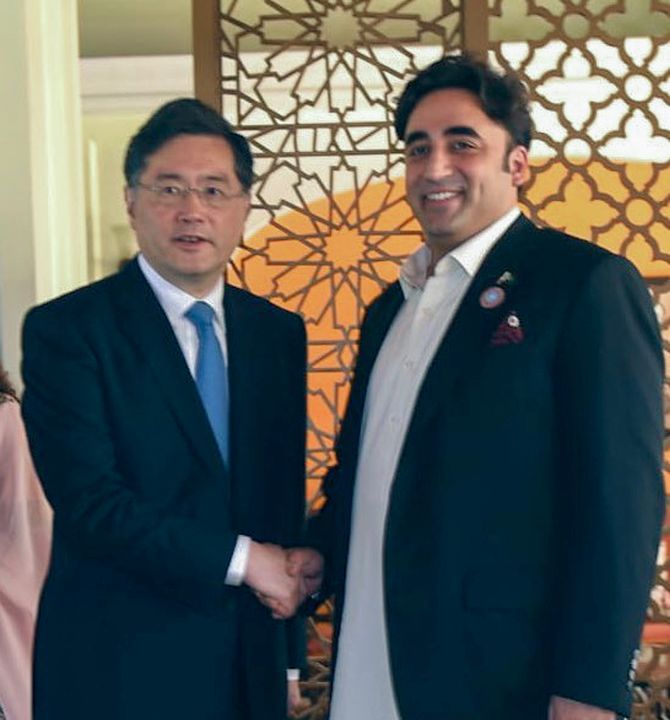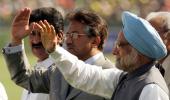Mr Modi might have questions to ask himself on the most formidable strategic challenge before India that he inherited from the UPA: The triangulation between China and Pakistan.
The failure to break out of it, or even loosen it a bit, is something to reflect on, notes Shekhar Gupta.

If the Shanghai Cooperation Organisation ministerial seemed unusually tense by the standards of such multilateral events, it is because two of its key members are at odds with the third.
Or, if you find it more appropriate, because one of its key members, the host, is at odds with the other two.
Don't fall for the temptation the more things change, the more they stay the same.
There are indeed things that remain the same, like India's slow strategic asphyxiation in the China-Pakistan pincer.
Manmohan Singh had described this as a straightforward case of China using Pakistan as a cheap instrument to 'triangulate' India.
Beyond that, since he handed over the keys to Narendra Modi, much has changed.
The SCO summit is a good moment to take stock of what has changed, and what hasn't. For now, let's focus on the three in our triangle.
Then we will explore beyond this, too.
A good place to begin is an assessment of how each of the three neighbours' Comprehensive National Power (CNP) has evolved in this post-2014 decade. The concept of CNP, by the way, is something we owe to the Chinese discourse.
The expression's Chinese original (zhonghe guoli) began appearing in publications emerging out of Beijing just over three decades ago.
As you would imagine, this takes into account a combination of a lot of factors -- not all empirical or measurable -- from the size and growth of the economy, the strength and cohesion of society, and the firepower and quality of the military, to trade and soft power.
But these things are not so easy to quantify and convert into numbers or rankings.
On most metrics, Pakistan, for example, would be a near-nothing today.
Where, however, will its 200-plus nukes and massive armed forces place it overall? Then, see it purely from India's point of view.
Thanks to its nukes and nuisance value, Pakistan isn't as much of a cipher as many in India would have wanted it to be.
The determinants of a nation's CNP, therefore, are also defined by how they affect their friends, adversaries, and neighbours.
Pakistan is today the weakest it's been since the eve of the Soviet invasion of Afghanistan in 1979.
It's ruled by a coalition government with a pretence of being popularly elected but with even less credibility than dictator Zia-ul Haq in 1979.
I say that with care because Zia's word was the law. Nobody will say so for Shehbaz Sharif's or his cabinet's.
The economy is bankrupt, and the growth rate for the year -- if you believe the International Monetary Fund (which some consider optimistic) -- is 0.5 per cent. It may go up to around 2 per cent next year.
The income gap between Pakistan and not just India, but all of the subcontinent, is now widening at a pace that should alarm Islamabad.

It won a suicidal, ego and ideology-driven victory in Afghanistan by defeating its own most valuable ally of 65 years, and is now left with almost no chips on the strategic negotiating table.
If its geostrategic location has been Pakistan's most significant, monetisable asset, it has blown it by backing the Taliban in that bizarre search for strategic depth.
The Gulf Arabs have moved on from where commitment to Sunni Islam determined their policy choices in the region. They have no patience for Pakistan and its constant demands.
This has reduced Pakistan to being China's vassal State today. And even there it has a problem.
Because it now has to share that tent with another, enormously more powerful vassal. It's Russia and it's of way more value to China.
At this point, almost nothing is going right for Pakistan.
It's left with only one card to play: India. Its value to China also lies in keeping India militarily stretched if not off balance.
That's of great value to China. Beyond that, the rest of the world is fed up of its complaints, demands and frequent moral outrage. What this means for India, we will come to in a bit.
China is a complete contrast. The decade has seen Xi Jinping define Chinese power in his name and dictatorial thought, leveraging four decades of superb growth.
Technology, trade, military power, social cohesion and rising global stature have all enabled it to close the gap with the US and the larger Western power, and increase the gap with the rest, especially India. Which is all that matters to us.
Strategically, the war in Ukraine has been both good and bad for China.
On balance, probably more bad than good. It knocks out the BRI plans for now, it weakens its most important ally, and unites the West.
The good thing is how dependent Russia is on China.
In any 2014-2024 projection, regrettably, on no parameter of CNP can India credibly be considered to have narrowed the gap with China.
India has grown phenomenally in many areas and there is much good happening. For example, the massive new construction of heavy, physical infrastructure -- roads, ports, airways, power and so on.

The management of the fisc and deficits despite the pandemic have been big pluses, and the growth rate is still the world's highest for a large economy.
But the inherited gap was too much, China isn't slowing, and even if India grows faster now, the distance between the two will increase.
Nothing will alter the fact that China's economy is more than five times India's.
The bitter truth is, the gap will rise even if Chinese growth slows down to less than half of India's.
Militarily, wide budgetary and firepower gaps apart, China has very deliberately dragged us in strength to the borders.
In the process, India is fully stretched militarily along both frontiers.
I am searching for parallels, but cannot find a phase in our history when we were so fully committed operationally on both frontiers.
The trouble is, in this equation India has no initiative to seize militarily, except to wait in case the other side makes a move.
Those moves, meanwhile, are in our vital neighbourhood, Bhutan, for example.
Which brings us to a place we are familiar with. Because we've been there for more than six decades now.
In his 10th year as prime minister, and the last in his second term, what would Narendra Modi write in his self-appraisal report on India's CNP and strategic positioning? The picture on the CNP is pretty good.
India's is a remarkable success story of a country becoming so enormously powerful long before it became rich.
Or even lower middle class. None of this is God given. Mr Modi and his government's management of the larger national interest deserve some credit for this.
In the self-appraisal process, however, Mr Modi might have questions to ask himself on the most formidable strategic challenge before India that he inherited from the United Progressive Alliance: The triangulation between China and Pakistan.
The slow-asphyxiation by an unmoving pincer.
The failure to break out of it, or even loosen it a bit, is something to reflect on.
You wouldn't believe merely maintaining India's strategic status quo of 2014 was on his list of KRAs as he concludes a decade in power.
By special arrangement with The Print











